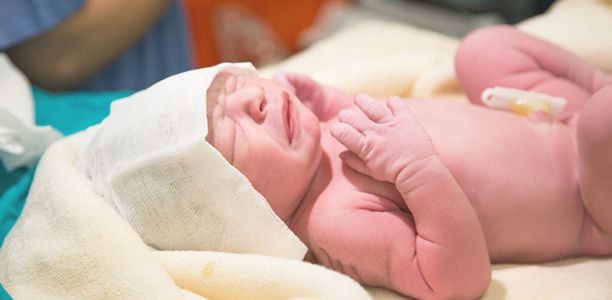Doctors are seeing a rise in the number of parents requesting so-called ‘vaginal seeding’ for babies born by caesarean section.
The practice, which is also known as microbirthing, involves taking a swab from the mother’s vagina and wiping this over the baby’s mouth, eyes, face and skin shortly after birth by caesarean section.
The idea is that vaginal seeding allows a baby born via caesarean section to come into contact with bacteria from the birth canal. The hope is this may boost their gut bacteria, and reduce risk of conditions such as allergies or obesity.
However, despite increasing popularity of the procedure, as yet there is not enough evidence to suggest it is beneficial, argues Dr Aubrey Cunnington from the Department of Medicine at Imperial College London, and lead author of the BMJ article. Because of this lack of evidence, medical professionals are not in the position to recommend or encourage the practice.
“Demand for this process has increased among women attending hospitals in the UK – but this has outstripped professional awareness and guidance. At the moment we’re a long way from having the evidence base to recommend this practice. There is simply no evidence to suggest it has benefits – and it may carry potential risks.”
Dr Cunnington argues there is a potential risk of transferring harmful bacteria, such as group B streptococcus, to the baby via the swab. Although this is the same bacteria a baby would be exposed to during a vaginal birth, Dr Cunnington says staff would not realise a baby has been exposed to this bacteria, should a newborn fall ill.
“Its important parents tell staff they have performed the procedure, so the healthcare team are aware the baby is at risk of the same infections as a baby born by vaginal delivery,” he says.
Dr Cunnington explains the practice seems to have started because evidence suggests babies born by caesarean section have a slightly increased risk of conditions in later life such as obesity, allergies and autoimmune disease, such as inflammatory bowel disease.
Some studies suggest these babies have a different microbiome (the collection of millions of bacteria living in our guts) to those born vaginally.
One theory suggests this may be because the bacteria the baby is exposed to in the birth canal during a vaginal birth colonise the baby’s gut. This helps to protect them against conditions such as allergies.
“The theory is that by transferring bacteria from mum to baby, these bacteria can then make their way to the baby’s gut and alter the bacteria in their tummy – called the microbiome.
There is now quite a lot of evidence that differences in the microbiome are associated with risk of developing conditions such as allergies and obesity. However people have made a leap of logic that gut bacteria must be the link between caesarean section and risk of these diseases. But we just don’t know this for sure – or whether we can even influence this by transferring bacteria on a swab from mum to baby,” says Dr Cunnington.
He adds there is only one ongoing study into vaginal seeding, which is examining whether the practice can change a baby’s gut microbiome.
However, in this study scientists are testing the mothers for potentially dangerous bacteria, which would not happen in a routine hospital setting.
“In some countries, including the UK, we don’t test pregnant women for the bacteria group B streptococcus. This is carried by around one in four pregnant women, and although it poses no risk to the mother it can cause fatal infections in babies. There are also other conditions that cause no symptoms in the mother, such as chlamydia, gonorrhoea and herpes simplex virus that could be transferred on the swab. One colleague had to intervene when a mother with genital herpes, who had undergone a caesarean section, was about to undertake this process. Swabbing would have potentially transferred the herpes virus to the baby.”
Dr Cunnington adds that often the husband or partner undertakes the swabbing process, but in some cases parents have asked medical staff to perform the procedure. Around one in four babies are born via caesarean section in the UK.
“Doctors, nurses, midwives and parents need to be aware they are doing something with a potential risk that currently doesn’t have any evidence of benefit,” says Dr Cunnington.
He adds that other factors can also affect a baby’s microbiome: “Encouraging breast feeding and avoiding unnecessary antibiotics may be more important to a baby’s gut bacteria than worrying about transferring vaginal fluid on a swab.”
(Source: Imperial College London)










